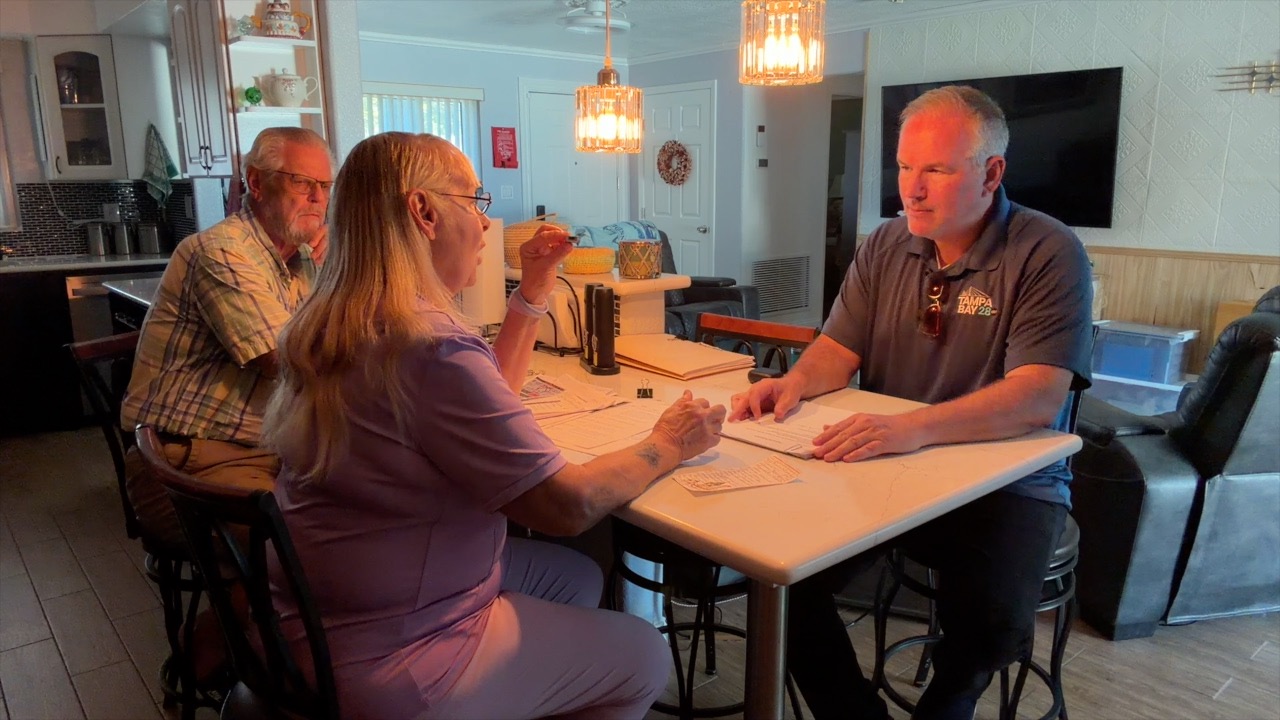NEW PORT RICHEY, Fla. — Residents in one New Port Richey neighborhood report that their homes were flooded with wastewater and raw sewage during Hurricane Helene, and they are urging the city to take action to prevent it from happening again.
Jackie Phillips said the flooding from Hurricane Helene got into her home, but it was nothing compared to the raw sewage.
Watch full report from Erik Waxler
“It was pouring out of the toilet like a fountain, flowing all out of there. It was into my walk-in tub that got destroyed,” Phillips said.
A few houses down in the Tropic Shores subdivision, Marta Brooks said she had the same experience.
Brooks shared photos showing the sludge that was left throughout her home.
“It was nasty. I walked into the house and I was totally traumatized,” she said.
Despite the sanitizing and renovations over the past year, residents remain worried that the infrastructure will not protect them during the next major storm.
When Phillips did not get the answers she was hoping for from city officials, she contacted Tampa Bay 28. She said the city had not properly maintained its stormwater system and that homeowners needed backflow valves to stop wastewater from flowing back into their houses.
“But the city has continuously shot us down, telling us they are not cost-effective,” Phillips said.
New Port Richey City Manager Debbie Manns said the city’s infrastructure worked the way it was designed to during Helene and that officials did the best they could during unprecedented flooding.
She said backflow valves are not foolproof in preventing wastewater from backing up into homes and they require ongoing maintenance. The valves also have to be installed on private property.
Manns said the city has learned from Hurricane Helene and is taking steps to improve infrastructure, including raising lift stations in flood-prone areas. She added that the only sure way to protect a home in certain flood zones is to elevate it.
In the meantime, Phillips, Brooks and several of their neighbors said they each spent about $1,700 to install backflow valves on their own.
New Port Richey’s Public Works Department sent Tampa Bay 28 a detailed report on how its wastewater and stormwater systems performed during Hurricane Helene, outlining both the challenges of the storm and the city’s response.
The report explains that the city’s centralized wastewater system depends on a network of lift stations to pump sewage to the treatment plant. During Hurricane Helene, the city kept those lift stations operating as long as possible to help residents who did not evacuate. Officials said shutting them down could have caused significant equipment damage and loss of service.
According to the city, rising water from the Pithlachascotee River and the Gulf of Mexico led to saltwater infiltration through manholes, private storm drains, and other compromised infrastructure. The surge ultimately overwhelmed parts of the system, even as staff worked to maintain service.
The report notes that New Port Richey’s stormwater network is a three-tiered system of neighborhood drains, canals, and larger outfalls designed to limit, but not prevent, flooding. City officials said the area’s flat terrain and proximity to waterways make it particularly vulnerable during tropical systems.
Post-storm assessments found that several homes in the Tropic Shores subdivision sustained significant flooding. A property on Drinkard Drive recorded 34.79 percent damage, just below the threshold for a formal “substantial damage” letter.
City officials said the system operated as designed under extreme conditions and that steps are being taken to strengthen infrastructure, including elevating lift stations in flood-prone areas. They also reiterated that backflow prevention valves must be installed and maintained by property owners, though the city recognizes they can help reduce future flooding impacts.
Share Your Story with Erik

For more than 15 years, Erik Waxler has called Pasco County home. He’s dedicated to helping his neighbors solve problems and celebrate those who help others. Share your ideas and tips with Erik below.
.

Largo family loses home in morning fire, forced to start over
Mother and her nonverbal son with autism 20 escape safely as the home is condemned; community steps in to help with housing and recovery.





